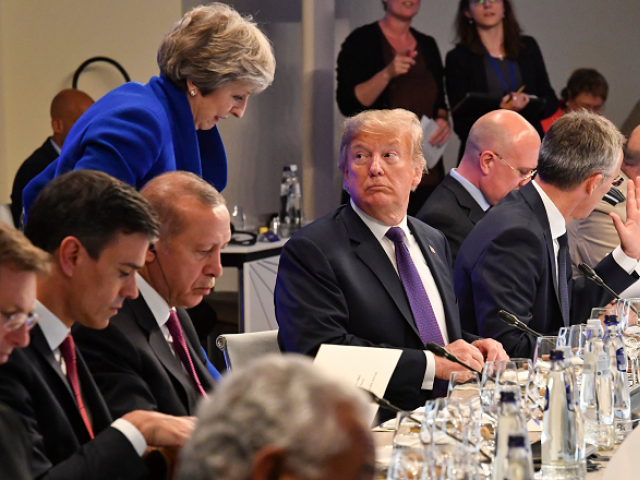NATO grapples over key policies in shadow of Trump spat

Agency
July 12, 2018

BRUSSELS – NATO leaders will seek to dampen a febrile atmosphere as their summit wraps up Thursday with talks on Afghanistan and Ukraine, after US President Donald Trump stung allies with a shock demand to double defence spending.
The summit in Brussels is shaping up as the alliance's most difficult in years, against a backdrop of growing unease about the threat from Russia and deepening transatlantic tensions in fields ranging from trade to energy.
Trump has set a bombastic tone for the talks, unleashing a barrage of criticism against European allies, including a clash with German Chancellor Angela Merkel.
The US president, who has said his meeting with Russian President Vladimir Putin next week "may be the easiest" part of his European tour, kicked off the NATO meeting with a blistering attack on Germany, calling it a "captive" of Moscow because of its gas links.
He also demanded NATO members up their defence outlay to four percent of GDP, from the current target of two percent within 10 years agreed at a 2014 summit in Wales.
Bulgarian President Rumen Radev confirmed that Trump had made the demand and asked what it meant for the future of the alliance that has been the bedrock of European security for 70 years.
"NATO is not a stock exchange where you can buy security. NATO is an alliance of sovereign countries united by strategic targets and common values," he told reporters.
But all 29 NATO leaders including Trump backed a joint statement committing themselves to greater "burden sharing" and to the alliance's founding commitment that an attack on one member is an attack on them all -- with no mention of the four percent.
- Friends like these -
The mood was already prickly ahead of the summit, prompting a terse exhortation from the European Union's President Donald Tusk for Trump to "appreciate" his allies and reminding him that Europe had come to its aid following the 9/11 attacks.
Trump has explicitly linked NATO with a transatlantic trade row by saying the EU shut out US business while expecting America to defend it.
The US leader has also singled out Germany for particular criticism over its defence spending.
Germany, Europe's biggest economy, spends just 1.24 percent, compared with 3.5 percent for the US.
Trump has taken particular aim at the proposed Nord Stream II gas pipeline, which is set to run from Russia to Germany under the Baltic Sea.
"Everybody's talking about it all over the world, they're saying we're paying you billions of dollars to protect you but you're paying billions of dollars to Russia," he said Wednesday at a breakfast meeting with NATO chief Jens Stoltenberg.
Merkel, who grew up in communist East Germany, shot back that she knew what it meant to be under Kremlin domination and was glad a united Germany was now able to "make our own independent policies and make our own independent decisions".
The pair later met for a one-on-one meeting and while Trump insisted they had a "very very good relationship", their frosty body language suggested otherwise.
- Kremlin concerns -
European diplomats are wary of a repeat of last month's divisive G7 in Canada, when Trump clashed with his Western allies before meeting Kim Jong Un at a summit, where he praised the North Korean leader as "very talented".
Trump will meet the Russian leader in Helsinki on July 16 for their first summit amid an ongoing investigation in the US into possible Trump campaign collusion with Russia.
There have been fears that Trump, keen to be seen to make a breakthrough with the Kremlin strongman, might make concessions that would weaken Western unity over issues like Ukraine and Syria.
Trump heads to Britain on Thursday, where the government is in crisis over Brexit and where tensions with Russia have spiked after London blamed Moscow for the death this month of a British woman from contact with the Novichok nerve agent.
The substance is the same military-grade toxin that nearly killed a former Russian spy and his daughter in an earlier attack that Britain also blamed on Moscow.
---


Leave Comment